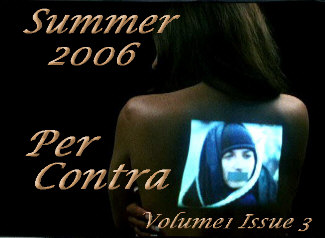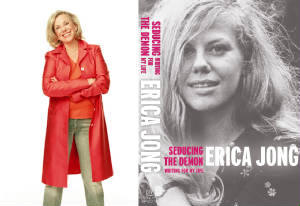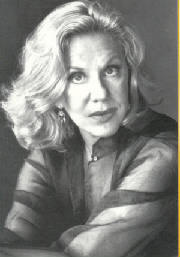
ďFinding and Keeping Your Voice in the WorldĒ - Erica Jong with Nettie Hartsock
Erica Jongís latest book Seducing the Demon: Writing for My Life (Publisher: Tarcher) is a highly evocative memoir of her life as a writer and a woman. Jong is an award-winning poet and fiction writer as well as the recipient of a United Nations Award for Excellence in Literature. She is the author of many books including the widely known, Fear of Flying.
In this no-holds barred interview Jong talks about living the writerís life, Puritanism, sexuality, memory, politics, President Bush and the power of women and how they can change the world for the better in the future.
On beginnings:
NH- Hi, Iím so thrilled to be talking to you. I read the manuscript and thought it was so great and really timely in regard to what is going on right now in the world. It resonated for me deeply both as a woman and as a writer, and I was wondering if you could just talk about how it started out.
EJ- It started out as a book about writing that I have been working on for decades, and itís been in my computer and in between novels, I would go back to it. I always knew there was something not right about it, something missing because it was a series of meditations on writing. At a certain point I realized that unless it basically had an autobiographical essay about my struggles as a writer, it wouldnít really resonate with readers.
So I began to write the things that I could remember about my early days as a writer, and as I got going I started laughing and giggling to myself, and I knew I was on the right track because I was laughing so much.
NH- In your book you talk about the writerís muse?
EJ- Yes I call the writerís muse the demon, and I describe how I got that idea about the demon. (From the Isaac Bashevis Singer short story.)
NH- Thatís a great story and itís a great description in your book of the woman and the demon having to be a certain way in order to work.
EJ- Yes, and thatís true, and I think in order to fall in love we both need kind of mutual delusions and the story captures that. The mutual delusion thatís needed for love sometimes. And I felt that very moving and the story worked on so many levels.
On writing:
NH- Can you talk about the writing life in general? One of the things you talk about in your book is the silence and despair and in your book you talk about procrastination and how you do anything ďbut writeĒ
EJ- Well, you know I canít tell you the number of times Iíve really wanted to shine all the copper pots in the house, get my jewelry and tarnish remover, shine all my shoes, any task, make a pot roast, and I would do almost anything to avoid writing what I was writing.
NH- Why is that? Is procrastination really a writerís response mechanism to being afraid to show your work?
EJ- I think itís fear of judgment. What Iíve found with writing students is itís always their fear of judgment that holds them back because if you donít finish something you canít be judged.
Itís also something else. We writers work alone. If youíre an actor everybody is there, the director, the actors and thereís other people to support you in the process of working. For a writer thereís no one. Youíre working alone and itís very lonely. And if youíre a responsibly gregarious person as I am, there are so many other things you can think of besides writing.
But I find [that] once I get into that flow state, where time is suspended, I want to go back to it again and again. But sometimes you have to have 50 pages like Henry Miller said before you find the fetal heartbeat.
And very often the early stages of the book are very difficult, the middle stages are somewhat easier and then toward the end the book starts waking me up at 3 in the morning. And not being able to resist it. You know I wonít set an alarm; the book will just wake me up to write it.
NH- Is it almost like what your book talks about? Youíre falling in love with the work then? It courts you and then itís waking you up to get you to finish it.
EJ- Absolutely. And once youíre in the flow state you want to work and thereís always a terrible letdown after the book is finished. You expect that youíll feel so free and feel so happy, but in truth youíll feel desperately depressed because you no longer have that thing on your desk waiting for you.
I think itís a very strange life and itís very lonely. Thereís wonderful moments of exuberance when you get things right, like you got a good sentence, but thatís about one day out of twelve when you feel that way and the other days you just often feel that youíre pushing the pen along and you donít believe in anything youíre writing but you know from experience that youíre going to feel that way and you should keep it up. And then sometimes you look back on the work and you think, ďI was crazy, this is really pretty good.Ē
NH- In your book you talk about working with groups, or having other people look at your work, is that why itís important?
EJ- I find that itís very helpful to me to have an editor to me that I can email stuff to. Even rough stuff. Somebody who is willing to be honest, but tough. Both.
On sex, President Bush and Congress
NH- You talk about how what people think about you is not so important. What do you think has been something that has been most misunderstood about you or your writing all these years?
EJ- Well, the truth is I started out to be an academic. I was getting my PHD in 18th century literature and my passion always was for satire. My master thesis was on Alexander Pope. When I first came out [it was by] publishing two books of poetry which won many awards, and were very much respected. After that, came out Fear of Flying which everybody claimed was a scandalous novel. I never thought it was scandalous when I was writing it, but that was the way it was bracketed and itís almost as though my seriousness as a writer, the fact that I loved literature and that I felt I was working in a tradition was completely overlooked in this country, because our country is so oddly puritanical.
On the one hand weíre titillated by sex and the newspapers promote everything with sex and on the other hand, weíre weirdly puritanical. Who would have believed that Congressmen who masturbate over their computers would go into the halls of Congress and pass bills for abstinence only sex education.
NH- There is such a dichotomy.
EJ- Thereís such hypocrisy in this country about sex. So on the one hand the tabloids use it and the womenís mags use it with articles about new sex techniques, as if there are new techniques and theyíre all about titillating the reader with the notion there might be new techniques.
What troubles me about sexuality in America is that everybody looks at sexuality as something thatís really forbidden. Thereís a hatred of pleasure.
People lie to themselves about sexuality, particularly politicians because they know in order to get elected they have to pretend to conspire in this hypocrisy.
NH- Another thing in the book that resonated with me and where you describe people have changed the words for things but they still are the same thing. We do have young men dying and old men sending them to war.
EJ- Absolutely, that has not changed.
NH- What do you think about the current political climate?
EJ- Gloomy view for the moment. I just read Seymour Hirschís article in The New Yorker, about how the government is scoping out to bomb in Iran, how Cheney and Bush are testing on nuclear bombs in Nevada. I donít know why the people in Las Vegas are not up in arms about this and the epidemic of leukemia that follows on nuclear testing and all the little children getting leukemia.
I feel that this president who was not elected either time and Cheney who was not elected either time have absolutely no right to poison our water and air supply for their own political goals. It is never reported in the mainstream press that they are testing nukes in Nevada, but they are.
And as a grandmother I am outraged at their spreading nuclear contaminants throughout the world. And if they go in, and bomb Iran, which I believe they are seriously considering, even though theyíre denying it, what right does this asshole have to poison the environment for my grandson?
NH- And this gets back to your book, itís powerful to me where youíre urging for people to speak their mind and say out loud what you want?
NH- And weíre the mothers, so thatís our job too.
NH- And how is the paradigm for women changing in the world?
EJ- I think just as weíre responsible for saving children and devoting our lives to making sure our kids grow up which we do to a much greater extent than men do although men are more apt to participate greatly in this than they used to be. This is a big gift from the feminism of the 70s that men can be interested in their children without being wusses.
NH- Absolutely, my husband is such a great partner in raising our children.
EJ- And then you have my father who loved his children but couldnít change a diaper without thinking someone was going to call him a wuss and weíve really liberated men to be close to their children in a different way than they ever were before.
NH- And that correlates with the movement of the 70s?
EJ- It came out of that movement. Co-parenting was the ideal to reach for and people can say that feminism failed but some of the things that were really radical feminist ideas have really entered the mainstream. And one of them is male parenting.
On the future and being a spokesperson
NH- Now that youíre done with this book, what are you working on?
EJ- Iím working on the fourth Isadora book about her in her fifties. Becoming a grandmother, watching her parents die, the stage of life where youíre sort of wedged between your dying parents and your crazy children, and where you canít find a place for yourself to be an individual, and thatís a stage of life that has not been written much about by women novelists, and I think itís important to explore it.
NH- Are you always working on something?
EJ- Yes. Iím always writing something. Iím very involved politically at this moment and I feel that those of us who can communicate publicly have an obligation to speak up against the nuclear contamination of the planet.
NH- Iíve been reading David Halberstamís The Fifties and itís so interesting that there are so many women and people that live like weíre in the fifties. No children and women going under the desks, but a President thatís not afraid of us getting into a war and this ultra-traditionalism swing of women.
NH- And what do you think about the recent developments in South Dakota? In your book you talk about losing choice.
EJ- I think weíre going to have lose choice in many ways to get it back. Many of the women of reproductive age today did not have the experience of friends of theirs being taken off for illegal abortions and coming back either sterilized or dead. If you havenít had that experience itís hard to imagine it. I never had an abortion but I had many friends who had one and never could have children afterwards, and they were the lucky ones because there were many who died of septic abortions. When you make abortion illegal, it doesnít stop it.
NH- Finally, as a prolific writer has the real gift been that youíve been not only able to speak your mind in your writing but to share the word with the world?
EJ- Yes, being able to share the word is the most important. Most revolutions have begun with the word, I think all revolutions have begun with the word, whether it be the American revolution or the French revolution, it was always a small group of writers who cared to get the word out.
Then people are moved by these words and come along. Itís harder now because so much media is owned by giant conglomerates which also own the weapons industry so itís more difficult to get the words out. But we still have blogs and sympathetic magazines and newspapers and I think they have not seen our power yet. The other power is for women to protect the planet.
Itís our only choice. If you look at CSPAN, what you see is a bunch of old guys with comb-overs making decisions that impact on women and their reproductive years, that impact on children. An epidemic of leukemia among children that is never tied to the nuclear pollution. I know a little boy in England who was a the child of friends of mine who contracted cancer of the thyroid because of Chernobyl and the radioactive cloud that came over the British Isles and struck people hiking in Scotland and Wales. And this kid survived but his growth was totally stunted by Chernobyl. This pollutants cannot be contained they go all over the world. Weíre all connected like weíve never been before.
When Bush was asked in a town meeting what gives him the right to pollute the world, take away womensí rights, and rape the environment, Bushís reply was, ďI guess Iím not your favorite guy.Ē He trivialized it and personalized it as if it was a nothing more than a high school popularity contest.
That is what we have to struggle against. When we have people with so little insight, and when there is no universal view of things or common cause, thatís really terrible.
And Bush and Cheney will be underground in bunkers, but the rest of us wonít.
NH- I hope you keep up the struggle for many years. Thank you for interviewing with us.
EJ- I really enjoyed it, thank you.


Erica Jong - Photo: Marion Ettlinger